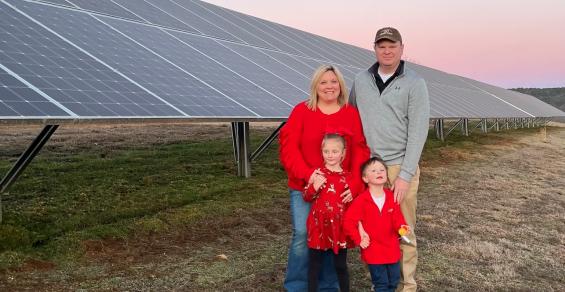Keen to find ways to improve energy efficiency on his farm, this Arkansas turkey farmer looked to solar power.
Theron Rowbotham knows farming. He’s the seventh generation to run his family farm near Hagarville, Ark., known as Infinity Ranch. His family has been in the poultry business for 70 years and today the operation features four turkey houses and 150 head of cattle.
Rowbotham also knows a little something about energy. In his off-farm job, he’s an engineer with a nuclear plant in nearby Russellville, Ark.
“I love farming because you get to see things grow and develop,” Rowbotham said. “The engineer in me likes to look ahead and see how to make processes on the farm better and more efficient.”
So, it is no wonder Rowbotham was keen to find ways to improve energy efficiency on his farm. And to do that, he looked to solar.
In 2018, he installed a 50-kilowatt, 144-panel solar power system on his farm. The panels produce enough power to run all four turkey houses. When excess electricity is generated, that gets put back on the grid, and Rowbotham gets a credit from the electric company.
“With the solar array you get some energy independence, you see cost savings and you get to lock in your costs,” Rowbotham said. “Then when you get it paid for you can invest your money in other projects.”
Rowbotham’s solar experiment recently earned him the Family Farm Environmental Excellence Award from the U.S. Poultry and Egg Association. As the Southeast regional winner, he was one of five winners nationwide. The annual award recognizes exemplary environmental stewardship by family farmers engaged in poultry and egg production and was presented at the 2022 International Production & Processing Expo in January.
A drone image of solar panels on Infinity Ranch near Hagarville, Ark. The positioning of the panels allows the backside of the panels to capture secondary solar reflected from the roof of the turkey house opposite it. This supplements direct sunlight and allows more hours of sunlight to return to the power grid.
Excellence Award
Rowbotham and his family raise turkeys for Butterball LLC, the largest turkey producer in the United States. Jeanie Rowbotham, his wife, is a University of Arkansas Extension Service employee and 4-H program coordinator.
The family is among nearly 700 independent poultry growers for Butterball, which nominated the Rowbothams for the award.
“Theron is innovating rural farming practices that traditionally rely on battery power,” a representative said in a press release. “Theron strongly believes in his responsibility to improve the sustainability of his family-run farm.”
While the solar installations were a key aspect in Rowbotham’s award, the U.S. Poultry and Egg Association also looked at nutrient management, water runoff management, the condition of houses and other aspects that contribute to the environmental footprint of a typical poultry farm.
At Infinity Ranch, Rowbotham raises birds for 12 weeks at a time — growing them out to about 14 pounds each. His birds will later be packaged as whole birds that you typically see at a Thanksgiving table.
Solar savings
Rowbotham worked with Arkansas-based Seal Solar to install his solar array. While the upfront cost is significant, Rowbotham said he has seen great benefits in locking in energy costs.
His 50-kWh system produces enough energy to power his four turkey houses through the fall, winter and spring. Each house typically holds about 16,000 birds. In the summer, when high temperatures require increased use of fans, he’s using more power than solar can generate, but Rowbotham said costs are still offset significantly.
While he was mum on just how much his energy bills have been lowered since installing the solar panel system, he insisted the cost savings quote provided by Solar Seal was accurate.
“I provided energy records before the installation, which allowed them to say how much I could be saving,” Rowbotham said. “Their projections were accurate. The system has operated like it should.”
Nutrient management
Beyond solar, nutrient management is another key aspect of Infinity Ranch’s sustainability plan. Rowbotham soil tests his pastures and hay fields. He also tests the turkey litter for nutrient content. Then he spreads it over his fields where it needs to be applied. He does not currently sell litter.
“The key to poultry litter is not over applying. You want to prevent runoff. But litter has helped greatly with our forage production,” he said. “You get greater quantity and quality forage when applying poultry litter.” Rowbotham does not use any synthetic fertilizers to supplement litter applications.
What growers should know
Rowbotham said he has received many questions from curious farmers interested in installing solar power on their own operations. His number one piece of advice to fellow producers is to recognize that solar is a long-term investment.
“The return will be there. You do make the money like they say you will. You have to look at it as I’m going to put in this solar panel system, in 10 years it will be paid off, and I can invest that money to upgrade my houses, upgrade the farm, and not have to pay higher energy bills,” he said.




